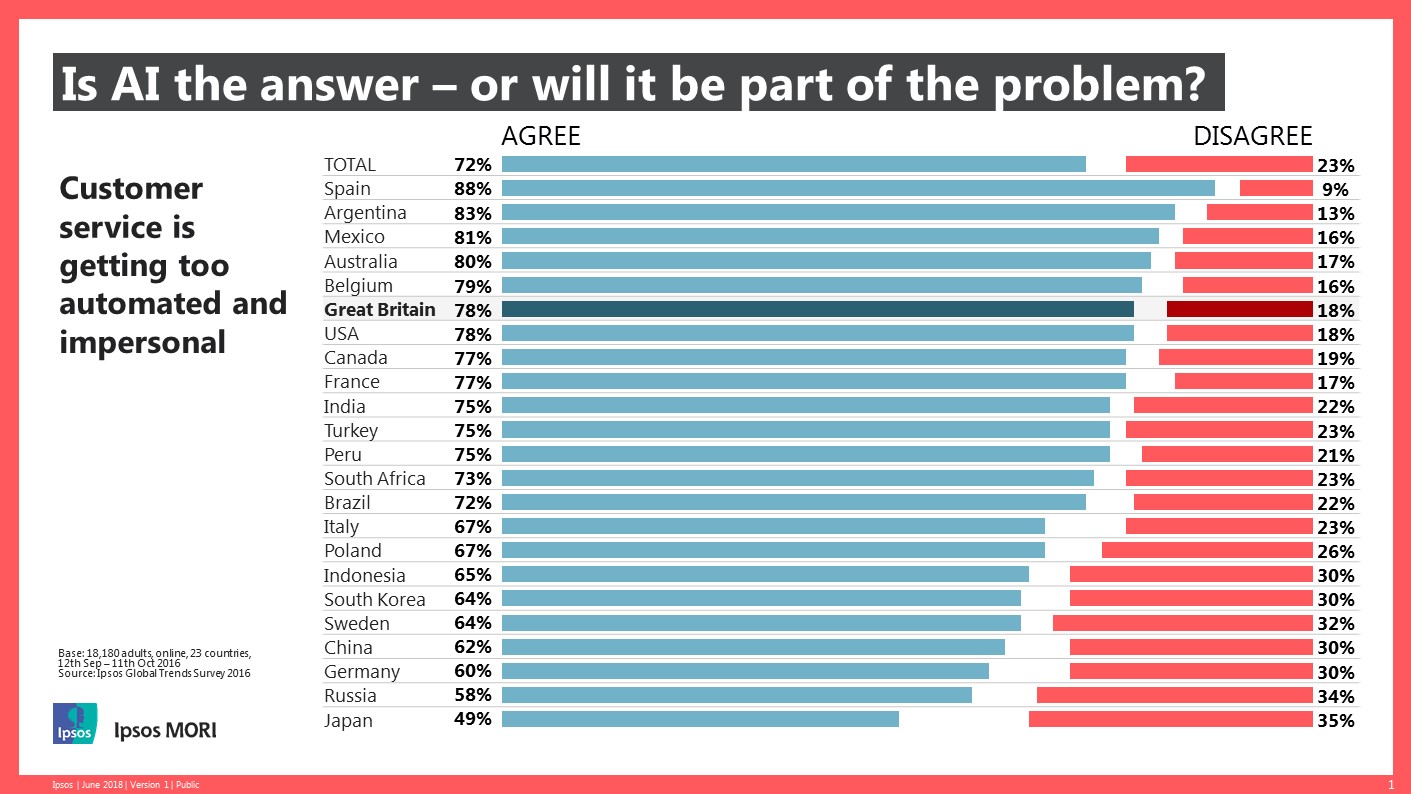Impersonal service? Ensuring AI enhances rather than diminishes the customer experience
The last few years have seen widespread deployment of AI based self-service tools that look to provide customers with cheaper and quicker ways to interact with brands. Yet in Ipsos’ most recent Global Trends Survey across 23 countries, we found that 7 in 10 agree that customer service is getting too automated and impersonal. Even in Japan, half think this is the case, while more than three-quarters of Britons feel this way. Is there a danger that brands simply reinforce this perception and damage relationships with customers in their headlong embrace of chatbots and algorithms? It is certainly a risk. Analysts Forrester recently predicted that satisfaction levels will fall as companies make increased use of automated tools that can’t yet deliver the level of engagement that customers expect1.

So, what can organisations do to prevent this happening to them?
Firstly, it is important to recognise that customers have significant concerns around the use of AI. In recent polling, more than half (53%) of the British public indicated that they would not be comfortable with machines making decisions that affect their life2. Now, it is likely that many of us simply don’t realise the extent to which AI is already impacting our lives. But, in work last year for The Royal Society3 on machine learning, we heard people expressing their worries that new technologies will depersonalise them, pigeonhole them and restrict their choices. Certainly not the engaged and empowering relationships that most organisations are looking to achieve with their customers.
To avoid this, here are five steps that organisations that are looking to utilise AI in managing customer interactions can take:
- Be clear how AI helps deliver a better experience to the customer, not just a cheaper or more efficient one for your business. Better could mean providing quicker transactions, more convenient access, or better choices for customers.
- Deploy AI at appropriate stages in the customer’s journey. Automated tools can provide deliver significant benefits at specific touchpoints, notably those that are more transactional. For sensitive or important interactions, where customers expect human contact, people remain essential – even if that increasingly involves working in tandem with AI. The key is getting the balance right.
- Tailor your AI enhanced customer experience activity for different customer segments. For example, some customers love to receive personalised recommendations while browsing websites, while others find that intrusive. Beware the one-size-fits-all approach.
- Involve customers in shaping how AI makes decisions. Increasing attention is being focused on the risks of biases being coded into systems. In designing how your organisation’s AI system makes decisions, ensure the voice of the customer isn’t lost.
- Ensure customers understand how their personal data is being used. Data is the fuel of AI systems. It is also a hugely sensitive topic. Our research shows that there is widespread distrust across many sectors that organisations use personal information correctly. While GDPR may provide part of the answer, organisations can do more, reassuring customers by demonstrating that they understand the importance of their data and that they are working hard to handle it, protect it and use it in the right way.

People do see and appreciate the potential benefits of AI. Two-fifths (42%) agree that businesses should continue developing and using artificial intelligence and robotics to automate work4; they can see the possibilities it offers to save them time and deliver a better service. There is a huge opportunity for organisations to use AI to deliver a personalised customer service at scale and overturn the perception that brands are distant and impersonal. But successfully seizing these opportunities requires putting people at the heart of experience design and deployment – or in other words, being intelligent with your use of artificial intelligence.
Notes
- Forrester: Predictions 2018: Blended AI Will Disrupt Your Customer Service And Sales Strategy
- Ipsos, British adults (1,002), interviewed online, Sept 2017
- The Royal Society / Ipsos, Public Views of Machine Learning, April 2017
- Ipsos, British adults (1,002), interviewed online, Sept 2017

